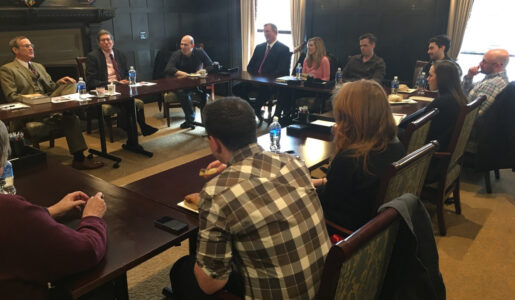Klarman Discusses the Making of the U.S. Constitution

Michael Klarman, the Kirkland & Ellis Professor of Law at Harvard University visited the Frederick S. Pardee School of Global Studies at Boston University on February 27, 2017 to discuss his latest book, The Framer’s Coup: The Making of the U.S. Constitution.
In his talk, Klarman explained how the framers met in Philadelphia and, with James Madison playing a key organizing role, drafted a constitution that was a “conservative counterrevolution” and a far different and more far-reaching document than many people expected, especially when compared to the Articles of Confederation.
Klarman said the Framers drafted and succeeded in getting ratified a nationalizing document that enhanced the power of the federal government at the expense of the states and was in many ways anti-populist or democracy constraining. According to Klarman, a key motivating factor was “what leading American statesmen regarded as the irresponsible economic measures enacted by a majority of state legislatures in the mid-1780s,” a reference to tax and debt relief legislation enacted by several state legislatures.
He also noted several anti-populist features of the Constitution such as the relatively longer terms of office for representatives (2 years), Senators (6 years) and the President (4 years) compared to shorter terms of office (generally one year) for many state positions; indirect elections for the Senate (elected by their state legislatures until 1913) and President (by the electoral college); and the absence of recall provisions for congressional representatives.
As Klarman explained, the framers essentially decided to go for broke in that they thought they might not have another chance to create a strong federal government. They were aided by the closed-door approach taken at the convention to ensure confidentiality in debates and discussions, according to Klarman.
Klarman stressed that as impressive as it was that the framers drafted this democracy constraining, nationalizing document, it was no sure thing that the states would ratify it. For this success, Klarman credits several factors including the fact that the majority of newspapers favored ratification as did city dwellers and elites such as wealthy land owners, lawyers, and merchants. To their credit, the pro Constitution Federalist forces skillfully organized and controlled the agenda such that other options were kept off the table, according to Klarman.
Since 2008, Klarman has been a professor at Harvard Law School. From 1987 to 2008, he taught at the University of Virginia Law School. His book, From Jim Crow to Civil Rights: The Supreme Court and the Struggle for Racial Equality, received the 2005 Bancroft Prize in History.
In addition to the Pardee School, Professor Klarman’s talk was sponsored by the BU School of Law, the BU Department of Political Science, and the BU International History Institute. Pardee Professors William Keylor, Erik Goldstein, Paul Hare, and John Woodward attended the talk as did BU Professors Robert Sloane (Law) and Brendan McConville (History). Michael Krebs (BU Law 1985), a partner at the Nutter, McClennen & Fish law firm in Boston, also attended.